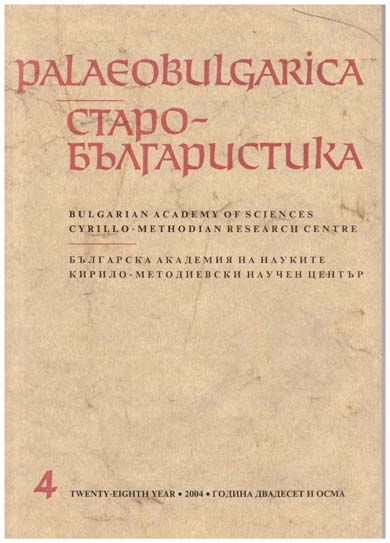H ПОСЪЛА КЪ ДЭЛАТЕЛЕМЪ РАБЪ
H ПОСЪЛА КЪ ДЭЛАТЕЛЕМЪ РАБЪ
(Social and Economic Terms in the Text of the Old Bulgarian Gospel as Evidence about the Structure and the Self-Consciousness of the so-called Barbarian Society)
Author(s): Valentin GeshevSubject(s): Language studies
Published by: Кирило-Методиевски научен център при Българска академия на науките
Summary/Abstract: The article claims that the majority of names for social roles and socio-economic relations in the Old Bulgarian Gospel are neither Greek loans nor literary translations from Greek words or phrases. This seems to be in unison with O. Pritsak’s, P. M. Dolukhanov’s and other authors’ theories according to which Common Slavic emerged as a specific linguistic entity (different from Common Balto-Slavic) about the middle of the first millennium AD when it became the lingua franca of barbarian societies in Central, Eastern and South-Eastern Europe – the language in which warriors, administrators and judges of various origins communicated with each other and with the rest of the population, rich enough lexically and stylistically to cope with broader social functions. The Old Bulgarian literary language was the heir to this lingua franca and, at the same time, it was the language of a society which, although already Christianised, was still characterised by imperial selfconsciousness and probably by a feeling of dislike, separateness and difference towards the Eastern Roman empire, its culture, way of life and the verbal symbols of this culture and way of life. The Old Bulgarian social and economic terms are evidence and a manifestation of a certain, probably spontaneous, unconscious, lexical and phrasal purism at a time when early Christian Bulgaria adopted a consciously purist linguistic policy by raising its vernacular to the status of the official language of church and state.
Journal: PALAEOBULGARICA / СТАРОБЪЛГАРИСТИКА
- Issue Year: 2004
- Issue No: 4
- Page Range: 88-99
- Page Count: 12
- Language: Bulgarian
- Content File-PDF

